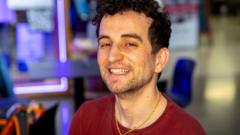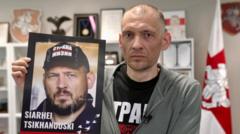René Shevan and Nujeen, two survivors of the Assad regime, recount their traumatic experiences during the Syrian civil war. With the regime's fall, they reveal their aspirations for acceptance and equality amidst ongoing fears for the future in a post-Assad Syria.
Survivors of Assad's Regime: From Fear to Hope in Post-War Syria

Survivors of Assad's Regime: From Fear to Hope in Post-War Syria
Two Syrian former refugees share their harrowing experiences under Bashar al-Assad’s regime and express their hopes for a free and tolerant future in Syria.
René, a young Syrian man, reflects on his journey from a traumatized prisoner under Bashar al-Assad to someone ready to reclaim his identity. He shares the emotional weight of his past, recalling instances of torture and rape he endured while imprisoned due to his sexual orientation and political beliefs. Now, he finds solace in the news of Assad's downfall, stating, "The republic of fear is gone." René acknowledges the ongoing challenges for LGBTQ individuals in a new regime that harbors fundamentalist views but expresses hope for a Syria where diversity can thrive.
After escaping Syria twelve years ago, René treasures the music box inherited from his grandmother as one of his last connections to his homeland. He dreams of a country that champions freedom and equality, despite the sobering reality that many like him faced persecution during the Assad regime. He wishes for protection for all ethnic and religious groups in the new political climate.
Similarly, Nujeen, a disabled Kurdish refugee living in Germany, carries a deep sense of hope following Assad's exit from power. Having fled Syria during the chaos of the civil war, her dreams of a better future have remained unshaken. "Nothing lasts forever. Darkness is followed by dawn," she asserts, confident that peace will be unattainable as long as Assad remains in power. She expresses concern for her family back in Syria, highlighting the precarious position of the Kurdish people under new leadership backed by Turkey. Yet, despite the uncertainty surrounding Syria's future, Nujeen's unwavering belief in unity and acceptance shines through, as she envisions a country built on love rather than division.
Both stories of René and Nujeen reflect the complex and often painful reality faced by Syrians today. While the fall of a long-reigning dictator brings a glimmer of hope, it is intertwined with a deep understanding of the systemic issues that still plague the region.




















